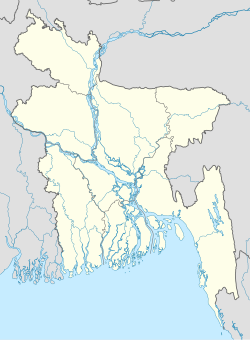Nagarkanda Upazila
|
Nagarkanda নগরকান্দা |
|
|---|---|
| Upazila | |
| Location in Bangladesh | |
| Coordinates: 23°24.9′N 89°53.5′E / 23.4150°N 89.8917°ECoordinates: 23°24.9′N 89°53.5′E / 23.4150°N 89.8917°E | |
| Country |
|
| Division | Dhaka Division |
| District | Faridpur District |
| Area | |
| • Total | 379.02 km2 (146.34 sq mi) |
| Population (1991) | |
| • Total | 267,193 |
| • Density | 705/km2 (1,830/sq mi) |
| Time zone | BST (UTC+6) |
| Website | Nagarkanda Upazila |
Nagarkanda (Bengali: নগরকান্দা) is an Upazila of Faridpur District in the Division of Dhaka, Bangladesh. In this upazila, in the village of Kodalia, the Pakistani Army killed at least 22 people including women and children on 1 June 1971. The incident is also recorded on film.
Nagarkanda is located at 23°24′55″N 89°53′30″E / 23.4153°N 89.8917°E . It has 51, 016 households and a total area of 379.02 km².
According to the 1991 Bangladesh census, Nagarkanda had a population of 267, 193. Males constituted 50.18% of the population, and females 49.82%. The population aged 18 or over was 131, 533. Nagarkanda had an average literacy rate of 22.6% (7+ years), against the national average of 32.4%. Most of the people depends on cultivation of land.Rice, Jute, Onion are the main crops.Onion of this locality is famous all around the country.
Nagarkanda has 17 Unions/Wards, 239 Mauzas/Mahallas, and 335 villages. Nagarkanda is divided into two Upazilas: Nagarkanda Upazila and Saltha Upazila.
...
Wikipedia

